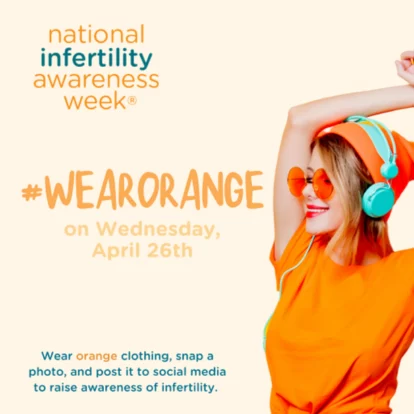National Infertility Awareness Week (NIAW) is an annual movement that focuses on educating the public on the realities of infertility. According to the World Health Organization (WHO), 1 in 6 people around the world will experience infertility- that’s nearly 20% of the global adult population. While awareness is important, so is taking action if you can’t get pregnant or stay pregnant.
Dr. Jasmine Chiang, REI at Conceptions Reproductive Associates of Colorado here in Denver, discusses what steps you can take and what to consider if you’re having trouble getting or staying pregnant.
Q: Why is National Infertility Awareness Week so important?
A: Despite a lot of attention in the media, most people still don’t talk easily about their struggles with infertility. It’s amazing what people could be going through while presenting as normal working, functioning people. My patients are inspirational. I think it’s important to be aware that 1 in 6 struggle with infertility, and they struggle with it while they’re at work and not saying anything. If you’ve been trying for 6-12 months without success, talk to your OB/GYN or reproductive endocrinologist about your fertility.
NIAW is a great opportunity where we can talk about these challenges and the word can spread. We still need to make sure that people realize that infertility affects men and women equally. While maternal age, egg quality, and quantity continue to be the biggest barrier to getting pregnant, infertility is not just a female issue. Sperm issues are the source of infertility about 33% of the time.
Q: On average where are most patients in their experience when you first meet them? Are they patients who are trying for the first time and want some answers? Have they done their homework?
A: Most patients who come to see me have been trying for a year or two, sometimes more. Some of them have done prior fertility testing treatments, and some of them have done nothing and haven’t been successful at finding answers. I would say most people who come in are starting with diagnostics, testing their fertility parameters.
There are several options for fertility testing. Imaging tests, ovulation testing, and ovarian reserve testing are some of the methods used to test for infertility in a patient. A basic semen analysis is the starting point for male testing. These tests can be performed by your gynecologist, fertility specialist, or even yourself with an at-home test kit.
Q: How has infertility treatment changed over the last 10 years?
A: Success rates have increased dramatically for one thing. On a per-patient basis, nearly 8 out of 10 of our patients will go home with a baby after 2-3 cycles.
When you look at 2013, a lot of things that we offer today were in their infancy, like elective egg freezing. Today, that’s a well-accepted and well-studied treatment rather than experimental. PGT-A has made IVF more effective by looking at the chromosomal balance of an embryo and only transferring those that have the correct number of chromosomes. This increases the chance of a healthy pregnancy and live birth delivery.
10 years ago, only a few centers like Conceptions were routinely practicing SET (single embryo transfer) and FET (frozen embryo transfer) which has made IVF safer and more successful. A lot of these things have evolved tremendously. Patients have become more familiar with what tools are at their disposal. These tools aren’t exclusively used in cases of infertility, they’re for everyone who desires to start, grow, or complete their family.
Q: You mentioned that because not everybody who comes to see you as a patient is infertile, right? You have same-sex couples and single-by-choice parents. What should they consider?
A: Obviously, you want a legitimate clinic with good embryologists and good success rates. It’s also about how comfortable you feel, right? It needs to be a good fit. If someone doesn’t feel comfortable about something, it’s not necessarily a good match. LGBTQIA+ patients face the same struggles as heterosexual, cisgender patients when it comes to infertility, however, hormone therapy and surgeries can create additional fertility complications.
I try as much as I can to make sure my patients feel comfortable and in the right place. I want them to feel that Conceptions is the right choice for them, and that they’re comfortable with all the nurses and the staff.
We have a great embryology lab which is important for all patients no matter their path to parenthood. That’s where we stand out as far as success rates, the lab is critical to producing success rates that meet or exceed the U.S. average.
Q: This year is the first year of the new infertility insurance mandate in Colorado. Have you seen where the mandate has made it easier for patients to access fertility care?
A: Tremendously. The Colorado mandate has opened up access for a lot of people. While it’s not everyone, because some insurance companies are not subject to the mandate, we’ve definitely seen an influx of people with some kind of coverage of fertility treatment. It’s been incredibly helpful, it’s given people a chance to try, who otherwise would have had to cease fertility efforts. The financials of fertility are heavy on people’s minds and is often not discussed openly.
Q: What do you say to somebody who may be reading this who is trying to get pregnant and is doing the research and the homework, but feels hesitant and worried?
A: We offer a safe space at Conceptions. The patient should feel empowered and in control to get the information they need from all of us from the doctors to nurses – everyone here. This is a safe place for people to be in charge of their fertility care.
Q: What do you think needs more attention during National Infertility Awareness Week?
A: Mental health. Period. There’s a whole other emotional journey that patients are taking and sometimes we’re so focused on their physical care that we don’t see the burdens and stress they may be facing. It’s not just your body going through this experience, but also your mind. You have to treat the whole patient, body, and mind. That’s my goal with every patient every day.
For over 20 years, Conceptions Reproductive Associates of Colorado has been a pillar of success and hope for patients across Colorado and around the world with clinical outcomes that meet or exceed US benchmarks. We’ve been part of some of the most important clinical research projects and global advancements in reproductive medicine from PGT-A, Single Embryo Transfer to using the most advanced storage system for cryopreservation. We also work with a team of emotional support experts to help navigate the many emotions of infertility care. To learn more about Conceptions, visit www.conceptionsrepro.com.
National Infertility Awareness Week®, (NIAW) is a movement, founded in 1989 by RESOLVE. All too often myths and misinformation appear in media stories or influence lawmakers and companies to enforce policies that create barriers for people who need help building their families. To learn more about RESOLVE visit, https://www.infertilityawareness.org.


